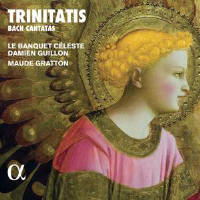Texte paru dans: / Appeared in: |
|
 |
Outil de traduction |
|
From the yearning opening aria of Ich habe genug Smith beguiles the ear with his mellifluous countertenor and naturally musical phrasing. His tone, smoothly produced throughout its range, is slightly more ‘covered’ than that of his one-time teacher Andreas Scholl and his contemporary Iestyn Davies; and he lacks their strong, baritonal low notes. Smith’s liquid line and care for legato make for a memorable Agnus Dei from the B minor Mass; and buoyed by a supple, springy continuo, he duets gracefully with Voces8 mezzo Katie Jeffries-Harris in the ‘Et in unum’, phrasing and vibratos perfectly matched. Although Leo Duarte’s rich-toned oboe is rather too forwardly balanced in Ich habe genug, the one-to-apart instrumental playing is superb, with poetic obbligatos from Duarte, violinist Bojan C?i?ic´ (in ‘Erbarme dich’ from the St Matthew Passion) and viola da gambist Reiko Ichise, broodingly eloquent in ‘Es ist vollbracht’ from the St John Passion. Steven Devine deftly negotiates his tortuous organ obbligatos in Vergnügte Ruh.
Instrumentally the performances are hard to fault. Yet for all the tonal allure of Barnaby Smith’s singing, I was left faintly dissatisfied. Even without comparisons, in both cantatas he tends to sound seraphically disengaged, floating his lines with minimal variation of colour and dynamics. Crucially, his German is softedged, so that the words rarely tell as they should. Turn to either Davies (Hyperion, 1/17) or Scholl (Harmonia Mundi, 5/98; Decca, 4/12) and you’ll hear a different order of involvement with these dramas of the soul. In the first recitative of Vergnügte Ruh Bach evokes a world of hatred, envy and ‘vipers’ venom’, which the singer contemplates with grief and loathing in the following aria. Smith, prioritising sound over sense, seems unperturbed. Burning into their consonants, both Davies and, especially, Scholl leave you in no doubt of the theological message. In both cantatas they ‘live’ the texts that much more intensely. There’s no denying the refined beauty and sheer skill of Smith’s performances. For me, though, his Bach needs to suffer more. |
|




